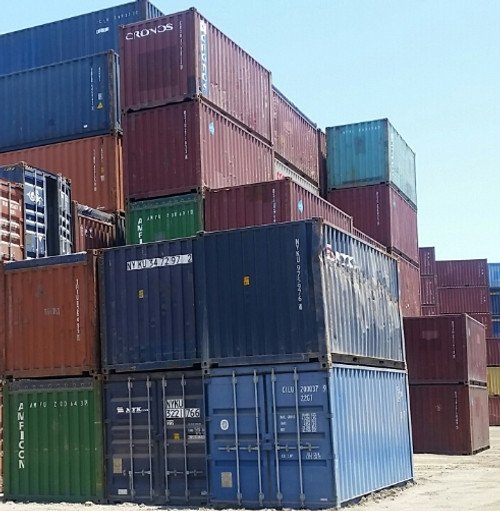Used Containers
Used containers, often referred to as shipping containers or cargo containers, are durable and versatile structures originally designed for transporting goods via ship, truck, or rail. Once they complete their primary shipping purpose, many of these containers are repurposed for various uses, making them a popular choice for businesses and individuals looking for cost-effective storage solutions or unique construction options.
Key Features:
- Durability:
- Made from weather-resistant steel, used containers are designed to withstand harsh conditions during transport, making them robust and long-lasting for secondary applications.
- Many containers are treated to resist rust, corrosion, and UV damage, prolonging their usable life.
- Sizes:
- Available in standard sizes, typically 20 feet and 40 feet in length. Some containers may come in larger sizes (up to 45 feet) or custom dimensions.
- The internal dimensions can vary, so it’s essential to check the specific measurements when considering a used container for your needs.
- Accessibility:
- Containers come with double doors on one end, providing easy access to the interior. Some models may have additional doors on the side for improved accessibility.
- Containers can be modified with windows, ventilation, and additional entry points for specific applications.
- Versatility:
- Used containers can be repurposed for various applications, including:
- Storage solutions: Ideal for temporary or long-term storage of goods, equipment, or personal items.
- Office spaces: Converted into mobile offices or site offices for construction projects.
- Pop-up shops: Used by businesses as retail spaces in various locations.
- Living spaces: Modified for residential use, creating eco-friendly homes or vacation rentals.
- Workshops: Converted into functional workspaces for artisans or small businesses.
- Used containers can be repurposed for various applications, including:
- Cost-Effective:
- Used containers are often significantly less expensive than new ones, typically ranging from $1,500 to $5,000 depending on condition, size, and location.
- Purchasing used containers can be a budget-friendly option for individuals and businesses looking to maximize their resources.
- Mobility:
- Containers can be transported easily by truck, train, or ship, making them a flexible option for businesses that require mobility.
- Some people use containers as portable storage units, moving them as needed to different locations.
- Custom Modifications:
- Many companies specialize in modifying used containers to meet specific needs, including adding insulation, electrical systems, plumbing, and interior finishes.
- Custom modifications can transform containers into fully functional spaces tailored to individual requirements.
Benefits:
- Sustainability:
- Repurposing used containers promotes recycling and reduces waste, contributing to sustainable building practices.
- Containers have a lower carbon footprint compared to traditional building materials, making them an eco-friendly choice for various projects.
- Quick Setup:
- Used containers can be delivered and set up quickly, providing immediate solutions for storage or workspace needs.
- Minimal construction is required for basic storage uses, allowing for quick deployment.
- Security:
- Containers are designed to be secure, with strong steel construction and lockable doors, providing reliable protection against theft and vandalism.
- Many containers come equipped with additional security features, such as padlock hasps and reinforced locking systems.
- Weather Resistance:
- Containers are built to withstand harsh weather conditions, including rain, snow, and high winds, making them reliable for outdoor storage.
- Insulated containers can help protect sensitive items from temperature fluctuations.
- Low Maintenance:
- Once modified for a specific purpose, used containers require minimal maintenance compared to traditional structures, reducing ongoing costs and efforts.
- Regular inspections and basic upkeep can ensure long-term usability.
Considerations:
- Condition Assessment:
- Inspect used containers for structural integrity, rust, dents, and signs of previous leaks. It’s crucial to ensure that the container is in good condition for your intended use.
- Some containers may have cosmetic imperfections but can still be functional for storage or modification.
- Local Regulations:
- Check local zoning laws and regulations regarding the use of shipping containers for storage, living spaces, or commercial purposes, as some areas may have restrictions.
- Obtain necessary permits if modifications are planned or if the container will be placed on private property.
- Transportation Costs:
- Consider transportation costs when purchasing a used container, as delivery fees can vary based on distance and logistics.
- Some suppliers may offer delivery services, while others may require you to arrange transport.
- Modifications and Upgrades:
- Budget for potential modifications if you plan to customize the container for specific needs, as costs can add up depending on the extent of changes required.
- Ensure that any modifications are done by professionals to maintain the structural integrity of the container.
- Ventilation and Insulation:
- If using containers for living or workspaces, proper ventilation and insulation are essential for comfort and climate control.
- Consider adding windows, vents, or fans to enhance airflow and prevent moisture buildup.
In summary, used containers are versatile, durable, and cost-effective solutions for a variety of applications, from storage to creative living spaces. With their sustainability benefits and quick setup, used containers have become an increasingly popular choice for individuals and businesses looking to maximize resources while minimizing environmental impact. When considering a used container, it’s essential to assess its condition, ensure compliance with local regulations, and plan for any necessary modifications to meet your specific needs.



Reviews
There are no reviews yet.